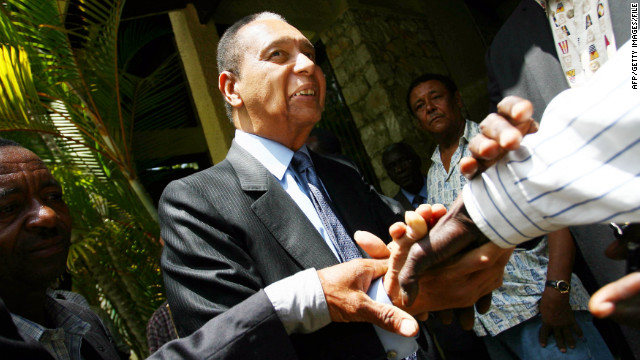By Brittney Hodnik
Impunity Watch Reporter, North America
PORT-AU-PRINCE, Haiti – Former president-dictator, Jean-Claude Duvalier (a.k.a. “Baby Doc”) returned to Haiti last year after twenty-five years of exile in France. Amid allegations of embezzlement and serious human rights abuses, it seems Duvalier will go untouched. The investigative magistrate overseeing the case ruled that he would not face any charges relating to the human rights abuses that occurred during his regime.

According to the Associated Press, Duvalier assumed the presidency when he was 19, taking over for his father (“Papa Doc”) who had an even crueler reputation. Duvalier fled Haiti in 1985, spending 25 years in France before suddenly returning to Haiti to face charges. Duvalier is supposed to be under house arrest, but, according to The Montreal Gazette, he roams freely throughout the country.
Both Human Rights Watch (HRW) and Amnesty International have documented systematic violations under Duvalier’s rule, according to CNN. He stands accused of imprisoning and torturing Haitian journalists and opposition forces. Javier Zuniga, a special adviser at Amnesty International said, “The cases of human rights abuses we documented in Haiti are likely to be only a small proportion of what really happened during Duvalier’s rule,” reports CNN.
After a yearlong investigation, Judge Carves Jean ruled that Duvalier would only face trial on corruption charges, as reported by CNN. Jean suggests that the statute of limitations has run out on those abuses.
Along with HRW and Amnesty, the United Nations spoke out against Haiti’s decision not to prosecute. “The High Commissioner has consistently reminded Haiti of its absolute obligation to investigate these well-documented serious human rights violations and to prosecute those responsible for them,” said Rupert Colville, the Commissioner’s spokesperson.
The Montreal Gazette reports Canada’s surprise that the decision did not generate more outrage. Reportedly, the United States, France and other Caribbean nations remained silent on the decision while Canada urged Haitian authorities to reconsider the decision. According to The Montreal Gazette, young people in Haiti are never taught about this infamous regime, and those old enough fear speaking out.
The earthquake in Haiti still overshadows many of the governmental problems the country is facing. Many would like to see countries such as the United States condition further funding on the definite prosecution of Duvalier. Canada’s Foreign Affairs Minister, John Baird reiterated its stance in support of Duvalier’s prosecution for all human rights abuses, according to The Montreal Gazette. “It is the Haitian government’s responsibility to provide justice to its people and due process, including fair trials, for those accused of crimes,” he said.
Still others are concerned by the fact that current President Michel Martelly employs many of Duvalier’s former cronies. The Montreal Gazette reports that Duvalier’s son too is among those serving under the new president. Brian Concannon from the Institute for Justice and Democracy in Haiti said, “Obviously, leaving something up to a corrupt, elitist, right-wing justice system is not going to bring justice for the Duvalier’s victims.”
According to the UN News Centre, Colville said that impunity for such serious crimes cannot be allowed to prevail. Human rights groups will continue to fight to bring Duvalier to justice for his heinous human rights violence.
For more information, please visit:
Associated Press — Haiti Leader Says he Won’t Meddle in Duvalier Case — 3 Feb. 2012
The Montreal Gazette — Frustration Follows Duvalier Ruling — 3 Feb. 2012
CNN — Human Rights Groups Denounce Duvalier Decision — 1 Feb. 2012
UN News Centre — Former Haitian Leader Must Face Charges for Human Rights Abuses, Says UN — 31 Jan. 2012


